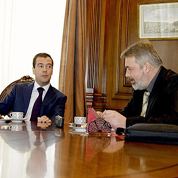Novaya Gazeta highlights the essence of press independence in Russia

Surprising the nation’s media gurus and political analysts, President Medvedev chose Novaya Gazeta, the weekly newspaper known at home and abroad for its objective coverage of issues, including caustic criticism of the Russian government, as the medium to carry his first interview in the print media, where he once again revisited his strategic vision of a modern society with a flourishing system of liberal and democratic values.
By all standards and criteria, Novaya Gazeta, due to its rigid uncompromising position on several issues, would have been the last publication to be allowed to interview the Russian head of state. However, against all expectations it turned out to be the first newspaper to earn such a high honor from the Kremlin. But this is not surprising as Novaya Gazeta, now a household brand name in Russia and abroad, has paid dearly for its independent editorial policy, having lost several high-profile correspondents, including Anna Politkovskaya to assassinations and other unsolved cases of homicide over the past decade.
Thus, living up to the newspaper signature reputation as one of the few, if not the only, really independent media outlets in the country, Novaya Gazeta Editor-in-Chief Dmitry Muratov took the president through all the tough issues, which are frequently avoided by other more influential media as ‘too unpleasant or sensitive’ to the Kremlin and/or declared ‘out-of-bounds’ either through official censorship or self-declared censorship, born from the innate basic instinct for survival among the local media owners and editors.
The questions asked during the interview included the Kremlin’s rationality in continuing the policy of imitation of ‘free-and-fair democratic elections’ instead cancelling them altogether, citing as an example the Sochi mayoral election, where almost all the opposition candidates had been removed from the ballot. Other issues raised in the interview included the fate of the jailed oligarch, Mikhail Khodorkovsky, currently facing another round of charges, judiciary independence, freedom of press and public debates, including on the Internet, the last oasis of freedom of speech, which is coming under increasing pressure from the government, the creation of a really functioning civic society.
Also discussed were the fates of the NGOs, reaffirmation of civil consent, taxation of the parents of the Beslan terrorism victims, whose children are studying free-of-charge in a Khodorkovsky education facility outside Moscow, brutality of recruits in the army, etc. As expected, the president, a professional lawyer by education and a seasoned politician, provided the most politically ‘correct’ and legally ‘relevant’ answers to all these tough questions, which at times, even went beyond the scope envisaged by the interviewer.
However, the most important lesson from the Novaya Gazeta’s unique Q/A session with the president is the fact the answers and other vital issues raised in the interview gave the first real hint about what the Medvedev presidency is all about, its goals and objectives and the mechanisms to achieving them, as well as other key policy issues in the pipeline that really matter to the Russian leader and society as a whole.
The genuineness of the questions and the sincerity of the president’s answers are all above board, as the questions asked in this particular interview, going by their acuity and the scope of topics covered, were obviously neither ‘doctored’ by the Kremlin, nor ‘self-censored’ as in most Russian media, by this newspaper’s editorial staff. Indeed, the ‘impromptu nature’ of the president’s answers to the questions that he never saw in advance, and therefore, could not have specially prepared for them, lends further credence to all the official declarations made in the interview.
Equally important is the fact that Kremlin had chosen this particularly newspaper out of tens of thousands registered print media outlets in Russia. This brings us to the ultimate issue, which is that being independent, despite the daunting difficulties, which, like in the Novaya Gazeta case, at times often include murders and assassination threats, still pays in Russia. It is, indeed, this hard-earned independence of opinion, manifested daily through objective coverage of issues of great social and political resonance, combined with the fearless display of unprecedented professional journalism integrity against fears and all odds in modern Russia that have combined to make Novaya Gazeta the default choice as the first print-media platform for Kremlin to transmit the president’s message of liberalism to its compatriots at home and members of the larger international community via this interview.
By all accounts, it is only the Novaya Gazeta trademark that carries such nationally acclaimed ‘untainted virginity’ in its editorial policy, ‘international respect’ and ‘unparalleled professional journalistic integrity’ in publications that were needed by the Kremlin to bolster the sincerity of the president’s pronouncements. It is quite clear to all — that the publication of such interviews in print media that have questionable connections with the government or dependent on it and/or have discredited themselves over the years through low quality publications that lacked credibility and/or specially ‘doctored’ to suit the powers that be — would have utterly failed to generate the same high level of positive social and political resonance at home and abroad like one generated by the Novaya Gazeta interview.
With this unique scoop, Novaya Gazeta has once again set itself apart from the rest of the herd in the Russian media community, which brings us to the last issue. And that is the stark reality that the questionable practice among top Russian media CEOs and editors of second-guessing the Kremlin’s thoughts on all issues of social and political importance, instead of offering different sets of well-argued alternative options is a retrograde step that should be entirely discarded. This is because in a functioning democracy, where the media is not seen only as the fourth branch of government on paper, but also as a real power, the people’s collective voice, vox populis, that really influences other branches of government through the checks-and-balances mechanism.












 Web design,
Web design,